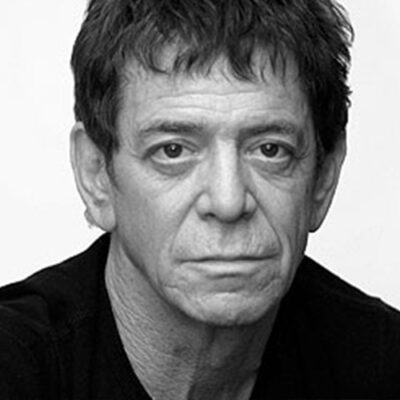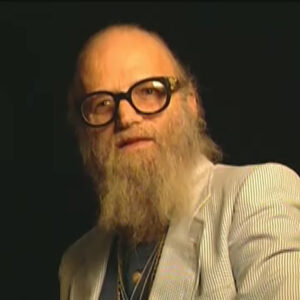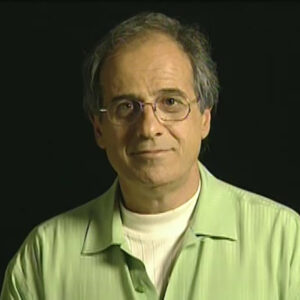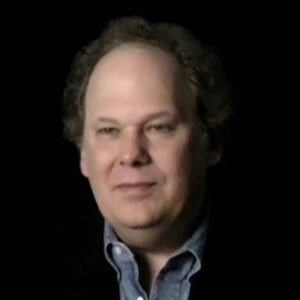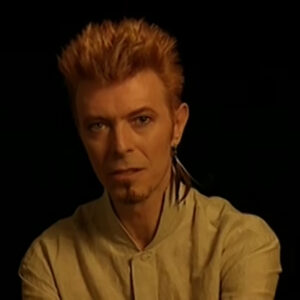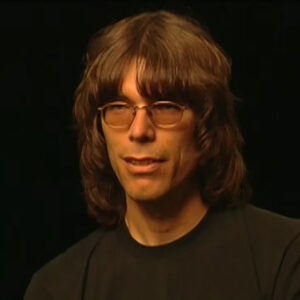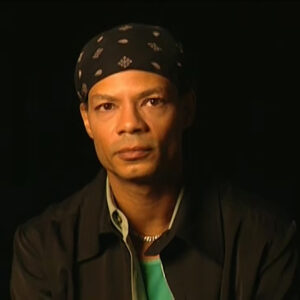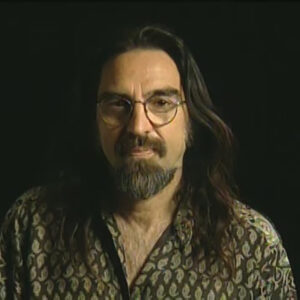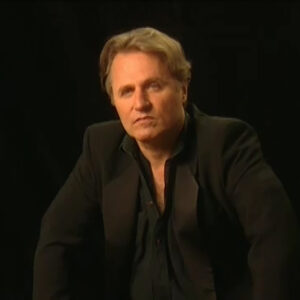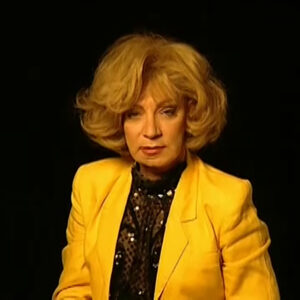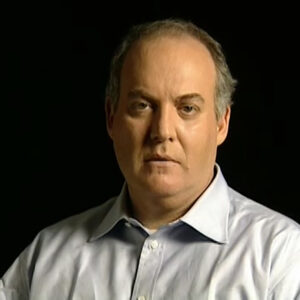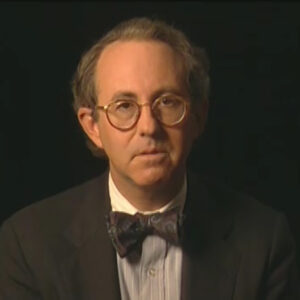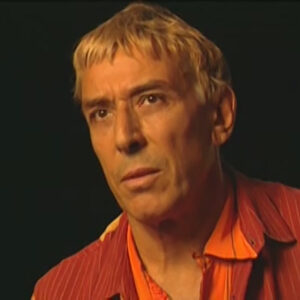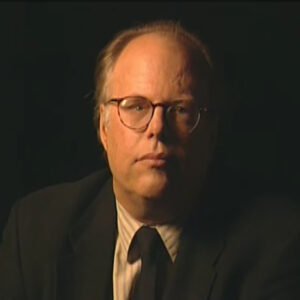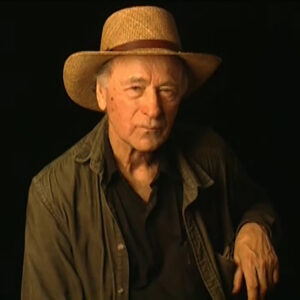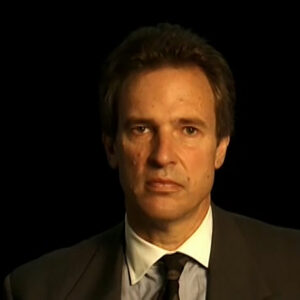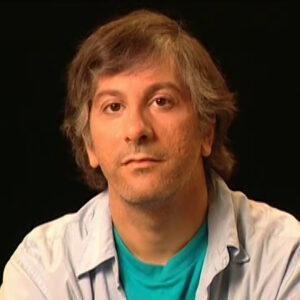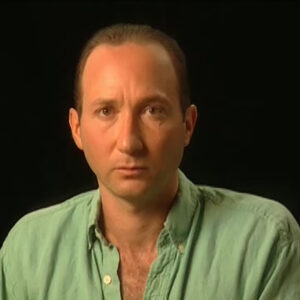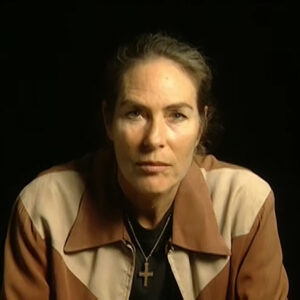Speaker Can you just talk that what you were they were like the house band for Max’s that summer. And it was amazing to me, you know, I mean, the Velvet Underground was like the band.
Speaker But, you know, it’s Lou, when I said, you know, everyone thinks we’re great, but we don’t have a pot to piss in. Oh, but I mean, they were playing every night, six hours, six nights a week, and sometimes two shows at Max’s Kansas City, which in those days hadn’t had bands before. You know, in the punk days later it did, you know, but it was it was amazing.
Speaker And Bridget Paulk. That was some of Bridget Polk was trying to cure me of her a heroin by giving me speed. And I came out after that summer. I was so wrecked that I had to go back on heroin and just to get my health back, you know, because was ten times more and more insidious. But at any rate, we went to every show and well, every night we’d go over there and then Bridget started to bring along her in the manner of Andy. She was brought a tape recorder everywhere and taking Polaroids and she was recording the shows. And that last night was that Lou played. He did all these very old, like pale blue eyes. And Candy says he’s very sentimental songs. And people were loving it, you know. And I remember he I think he said on the tape. It’s so good to be playing these songs, you know, and. And the thing was, you could hear me because I was there holding the mike. Remember, Bridget got the credit for being the sound engineer, but I was really the engineer that record. And on it, it bummed me out because I would love to have a sound engineer credit. But at any rate, I said hideous things like, could you get me a two and all or four dance doesn’t get me a pair. No, please. And to the waitress. And do you have any Tumin Olsen and yet horrible stuff on it. And I was being all chatty. I mean, we didn’t know what this tape was going to become an album, you know, that had never happened before. It was one of those little like Sony tapes, tape recorders that reporters carried around. Good. But not for recording music. And I don’t know that two months later, I heard that Bridget sold the tape to the record company was. Which was great because I used to play. Listen to that particular tape every night. Because these songs were so heartfelt and everything. The fact that, you know, I didn’t know until after the fact that that was Lou’s last night with the band. But I mean, in fact, it ends is so amazingly in retrospect.
Speaker Can you. That’s beautifully said. Can you. Can you talk about those some of those songs from that Velvet Underground period that were to use the. Personified. Talent as a writer and a particular songs are.
Speaker Well, I mean, I like the song from the third Velvet Underground album. I mean, always, of course, everybody goes back to your first album. You know what happened to me with a Catholic boy out and stuff in there is like an energy that pops out your first album. And you can’t deny that. And the Banana album was great and it had fantastic songs.
Speaker And of course, Giant Kales contributions were amazing. It was a different sound. But lyrically, I mean, Lou was so open and instead of just being in these hip songs that nobody had ever imagined they would hear before, so adult, you know, they were there was this Quality Inn on the third album of on a bash like sent sentiment. But if it could, it could be in there because Lou Counterpointed was with his natural cynicism. And counterpoint is the key to any good art and done. And it was also counterpoint in it with the music, you know. I mean, you had very harsh sound against a very, very like naive melody, my naive lyric. And I mean, songs like Gone Pale Blue Eyes and especially Candy says I mean, Candy said that Candy, darling, I’ve come to hate my body and all that it requires in this world. And just the music with those first two lines, I mean, it just said so much. I mean, and it was in pale blue eyes. I mean, it it’s so simple when you sometimes feel so happy. Sometimes I feel so sad. But but but then it goes on to have amazing lines in it. I mean, poets think in in minds. You know, it’s a good line. That was a great image, you know, and and that’s how I knew Lou is not just I mean, you distinguish between writing songs and writing poems, you know? And I always when I was writing songs, I hate that when people said poetry with music, there was song lyrics. It’s a big technical difference, you know. But Lou’s instincts were completely those of a poet, you know. His his sense of phrasing was impeccable. You know, he knew how to get the most out of a line, you know, out of an image just by a certain poor. Is this his or is this. I mean, you know, and and just juxtaposing as a certain like a power cord and holding back with the punch, the tag line of a song. I mean, he knew so much about that phrasing, which is just a natural instinct of a poet. You know what? You have to think about it on the page rather than on record. So that’s what was great about the songs on that third album.
Speaker But I mean, you know, give me an example of what you just said about the song, which is sort of a punch phrasing and then.
Speaker A particular song where you you were talking about just and I didn’t I I get a lot of lies, he just said to like, uh. Well.
Speaker Actually, I. This is yeah, there’s so many lyrics running, running through my head that it’s it’s hard, it’s hard to like just think of one where that happens. Actually, it happens a lot on because of the music counterpoint on the first album on. It happens. It happens a lot on that. But that with that whole drone thing, it’s easier to do, you know. But I’m trying to think. I mean, he does it through out in like Candy says, you know, I and and I have so many mishearing to that that I know get the lyrics wrong.
Speaker So I don’t want to get it right. Right. Yeah.
Speaker Yeah. And all that requires in this world that doesn’t really illustrate the.
Speaker I just loved the way you were describing it. I don’t know what to say exactly, but it was. It seems like the purpose of the punch.
Speaker Oh, well, OK. I’ll give you the ultimate. Well, I mean, we’re going we’re skipping ahead in time now to his solo career. But the ultimate. And I don’t know. I don’t have that in front of me. But the ultimate was perfect day, which I thought was you so well in the Trainspotting soundtrack. I mean, this counterpoint, just by the nature of the lyric, you know, it’s such a perfect day.
Speaker I’m glad I spend it with you. Such a perfect day. But then you just keep me hanging on so you get this dark, dark thing. And then you’re going to get you’re going to reap just what you sow. This is a chorus that fades that you’re going to reap just what she. So and. And this really like threatening. I mean, violent. Yeah. Lyric is set off by these very rich violins in the background. Oh, very classical sound. And all of a sudden you’re gone.
Speaker And then it’s also like sad song on on in that period too, you know, on you. She looked like Mary Queen of Scots. It was so very hard.
Speaker What you meant to me. And then.
Speaker And then he start and then but then later on, he says anybody else would have broken both of your arms. Oh, I mean, staring at the picture book. You looked like Mary Queen of Scots. I tried so very hard. I mean, now it’s just such a great I mean, it’s a great image. She looked like Mary Queen of Scots. And then you just say, I tried so very hard and then it wasn’t what I thought it would be. And then and then he changes the melody and it starts building and he talks about anybody else would have broken both of your arms for what you did to me. It just blew me away, you know. And that’s like I mean, people don’t even think of that song as one of Lou’s great songs, you know? But I mean, poetry wise, that’s it’s a very simplistic lyric with an incredible little ins and outs that go through it that just packs such a wallop, you know? So, I mean, that that’s that’s what I’m talking about. The melodies were always so sweet over these incredible violent images in the lyric.
Speaker Beautiful. That was really great. Describe things perfectly.
Speaker Before we get away from the Maxes album, if you could just say again concisely about so we can really use it to describe it. I would just say it was the Velvet Underground, like Mexico City. It was August 23, 1970. Used to say that it was the last night that performed. I need you to say kind of one phrase that I can use it pick up.
Speaker Well, yeah. What? I mean, I remember was it was the Velvet Underground live. They had been playing live six nights a week at Max’s Kansas City all summer. And this was, what, August 28? Twenty third.
Speaker August twenty third. It was. And if as it as it turned out, it was it was Lou’s last night with the band. The band actually did go on and play two more weeks, but without Lou. And it was almost done. You all sang the lyrics and it was he. He’s a good singer, technically, but that’s where you saw the phrasing aspect because he made the songs as as Danny Fields said, they were cute because they had an almost cartoonish quality to them after hearing Lou. See, also this. This pertains to what I was talking about with Lou as a lyricist in general, with the sentimentality that came into play on the third album, something that Dylan would never risk like on his records. Dylan would never take a chance on being anything but ultimately hip in that amphetamine driven days. You know, he wouldn’t take a hit on a chance on SEEM in the least bit sentimental. But any artist has to do that and with Lou is no problem because he had a natural cynicism that just counterpointed it so easily. But I mean, what you get from that is the fact that you weren’t just it wasn’t just an intellectual trip with the lyrics. You know, I I’m writing clever adult lyrics. It was a hard quality that what Henry Miller called the inner register, which is necessary for for good poetry. You can’t have one without the other. So that’s what you were getting at that time and since. And by the time was August 2013. And that night when Lou is playing his last gig with the band at high quality was completely on his sleeve. He was playing these old songs out of the blue. The audience was going crazy. I mean, and it wasn’t a big audience. See that? To think back of how many people would be there for that show. Now, after all the bands influenced by the Velvet Underground and there was about, you know, 50 people in that room and I’m standing there with the mike not knowing this is going to be a record babbling away about, you know, drugs, give me drugs and can you crack down and get me a drink and oh, my God, look, he’s over there. I hate to be that person. And so and then, you know, of course, I see that person the week after the record comes out. So it was you know, it was amazing to be watching it. But in retrospect. But. But then you really saw it when they played two more weeks with Doug during the lyrics. And, you know, they almost had this kind of. It was cute, you know, as opposed to, you know, real. And and that’s what you so, you know, you saw the what the lowest was right.
Speaker There was great. Jemmett, look, at this point, I can jump to March of seventy one, where if you could just set us up. Where how you got involved with the poetry project? Kind of said to me about how you say you saw, though, is more than just a rock musician. You know, as a poet and how you convinced him to do that.
Speaker Oh, well. I remember I was on. I saw I saw Lou at at Max’s. I had met him, you know, a few times. He was downstairs. I had only met him a few times. Remember the first time? And it was in Central Park. And I came up and I told them.
Speaker Well, that’s when I first told them how much I was like the token prodigy on the poetry scene. I was about 17 years old. And, you know, the Velvet Underground would light the band for me. You know, The Stones and the Velvet Underground. And Don, I. I saw him walking by himself near the fountain in Central Park. I was sitting down there and that’s where everybody hung out Sunday. And it’s slavery. God. So I would never think of going up there anybody else. But I. I had to run up to Lou Reed and. And, you know, I already had a good reputation as a poet. And I went out to him. And I start talking about to give some credentials. So he listened to me. I told them, yeah. Oh, I listen, I love your music. You know, all the poets that St. Mark’s poetry scene, which was like the you know, the so-called New York School of Poetry, was the leading avant garde movement in the country. And then I guess. And you had like Ted Berrigan and Ann Waldman and who were the second generation coming from Frank O’Hara and John Ashbury and Jimmy Schuyler. Kenneth Coke. There was a whole scene, you know. And Lou is very incredulous, first of all, about, you know, the fact that the poets really that, you know, I thought, oh, they just think of me as some, you know, songwriter, you know, dismiss me. But I said, no, no. I mean, they love you down there, you know? And I. I told them how Tom Clark, who is a great poet and the poetry editor at that time of The Paris Review, which was the prestigious magazine which you’d save your best poems for, had asked me if I could ever speak with Lou that I had to ask him to send him some poems, you know? And as it turned out, I mean, I told them that. I asked him that. And he was very incredulous, you know. And I remember I said, I’ve got these basketball, these things called The Basketball Diaries. An excerpt from this book I’ve written when I was like 13, 16, that coming out in the Paris Review of that. Twenty five pages of them soon. And you should check them out, you know. And I start telling them that it’s different adventures in The Basketball Diaries growing up and stuff. And he looks at me and gives me that Lou face and says.
Speaker Are you for real, kid? Are you sure you’re not making all of this up in your head? I thought, oh, God.
Speaker You think some. Poor thing, you know.
Speaker And I said, no, they’re really going to come out, you know. I’ll I’ll send you one of my own carpets, for God’s sake. I swear. And so I thought, oh, God. And he looked at me like this whole rap was I was so not coming up to him. But at any rate, the next time I saw him, I was down at. I walked into the back room and Max’s and he was sitting at the table and he called me over and said, Jan. And by this time I think my first book of poems, living at the Movies had come out, you know, from Viking, you know, a penguin, a Viking and dumb. And so he was there and he he had seen my book. And I guess he knew that I was that I was who I said, as you know, and I wasn’t just making it all up in my head and so on. I, I, I said to him again, he said, You’re doing great, man. You know, this is and this is he. The Velvet Underground is all over you. He really didn’t know what he was going to do at the time. I repeated that request to send poems to The Paris Review. And he took me seriously. Then I gave Tom Clarke’s address and he sent them to him and talk like immediately, you know, sent a sentence like about five lyrics, one long one. I think one of them was the actually the the murder mystery, which was on the third album, a very long one, where it’s kind of two lines with Moe Tucker doing part of it and him doing the other. It’s like the first rap stories song, really. And he has it. He had it published in two columns, you know. And so Tom pulled and that’s quite long. So Tom Polish is really good array of Lou’s poems and lyrics. And and I mean, he just loved the fact that, you know, he was published in The Paris Review.
Speaker And then, you know, I realized that I was right. People, you know, down at same marks really liked his work. And I I had reading coming up. And, you know, usually they the two people read on the Wednesday night readings. They asked me who I wanted to read with. And I said I’d love to read with Lou if if he’d do it, I’m gonna ask him. And I saw him in and I asked him and he said, sure. And I knew he was very trepidations about it, you know. But that’s the thing, Lou. I mean, gets that way sometimes is very hesitant to commit himself to something. But then at. We did it. And after he did it, he came up to me and said, I’m so glad we did this. It was so much fun, you know? And and it really was I mean, it went over so great. I mean, he read, you know, poems that were on the written for the page and he read a lot of lyrics and stuff.
Speaker And of course, most of the people there are, if not all knew the Velvet Underground work. So, I mean, they were hearing him read these lyrics and just. I mean, it’s such a great audience at St. Mark’s. It was it was just it was just a great night and so on. And he was glad he did it and I felt terrific about it.
Speaker Do you remember any particular things he read specific?
Speaker I yeah, I, I think he was. He was reading like I think he was reading. I remember he was reading songs like on the. European sun and stuff because he wanted to give homage to Delmore, Schwartz and stuff and, um, which was an interesting aspect because, you know, it’s at St. Marks, it was so avant garde that Delmore Schwartz suddenly was is brought into the picture. And it’s so strange that he’s an influence on Lou. Because, I mean, Delmore Schwartz is basically was an outsider in the academic scene, but he was still thought of as an academic poet, you know. And that it was kind of verboten at St. Marks, you know. But, um, I mean, so Lou came from a much different place in its poetic background than most of the other people. I mean, Dylan was coming from the Beats and Ginsberg and as influences and things like that. But Lou is actually much, much warmer air. You dighton in his background and just, you know, filtered that through his natural street sense and and got this immediate personal style, which most poets or writers take years to get, it seems. But he I remember him reading reading that piece. And, you know, it was just like pieces from his the Velvet Underground albums and a couple of poems which he had published in the poems, the pieces that he sent to the The Paris Review, of course. And and then I remember him reading, I think, a couple of the. Poems he played in that last summer with the Velvet Underground at Max’s Like Here Comes the Ocean, but saved for his first solo album. So I remember reading that because I always wondered why he didn’t put that on the last Velvet album. The Loaded album. He said, I’m saving.
Speaker Perfect. Karen, any thoughts that I need? Yeah, that was great.
Speaker You know, I have your Lou’s book between thought and expression contains selected lyrics because.
Speaker How do you write? Read his poetry in Europe.
Speaker Well, I mean, they you know, I mean, Lou would be the first one to say that, you know, I feel very uncomfortable at readings without a bank B, you know, but I mean, I’ve heard him. I mean, both men at their first reading. And I mean, then we did a reading recently. It was like the 25th anniversary of that reading. But also there was a period like in the 80s right after like my third album. And I think right before I actually was when Lou is recording new sensations, when my ex wife Rosemary and lose Sylvia. Then we we went up to Toronto and we read together at this theater. And. And he was reading mainly lyrics and stuff. And then. And it was an amazing reception because his poems did read a lot better. I mean, some songwriters who are sophisticated songwriters and write, you know, images that are very powerful with on the stage with music. I mean, you just hear, read or read it on the page and it and it just kind of really for sure. You know? But with Lou, the pieces were I mean, they they stood up completely without without music. I mean, he’s still I mean, was die hard. And it’s assessment that he was you know, he thought that it needed that noble, savage backbeat, you know, but I mean, it was totally there. And the audience loved it. And then we did we did it. It’s like a mini tour. We did one at the West Side Y Poetry series. And it was the only reading that they did that they couldn’t fit in their own auditorium. We had to do it in the Ethical Culture Center on Central Park West, says Auditorium, because it was such a big crowd. You know, I remember reading that with Allen Ginsberg and they put speakers outside, but they didn’t put us in a bigger auditorium so that it was quite impressive to me. And he he was reading lyrics then. And it was I remember afterwards I said, what do you ever read that murder mystery piece? You know? And he said, well, it takes two people to do what I said. I do it with, you know, it’s a great piece. And he said, Oh, I wish you told me that, you know, so maybe someday in the future we’ll get to do that. But, um, I mean, just as light as poems. I mean, you take a piece like as a complete poem you take and it’s not you know, it’s not thought of as one of lose. You don’t think of it as one of Lou’s great songs. Really.
Speaker But here it is.
Speaker At least most people don’t. But the lyric for the song, The Bells, I think is more of a poem than it is a song, you know. And it has that in a register. Hot quality that so much. I think that I don’t know how Lou works, really. If you read on if he redrafts the line, if he makes a lot of changes, I, I would imagine he does it as he goes on. It’s like it accretion is something I’ve heard a new law around writing out in New Jersey and stuff, but I usually write to nobody’s around, I think and. But with this, I, I take a guess at this pretty much came straight out and didn’t have he didn’t have to make many changes afterwards.
Speaker And the and the actresses relate to the actor who comes home late after the plays have closed down, all the crowd scattered around through the city lights and the streets. No ticket could beat that beautiful show of shows. Broadway only knows the great white Milky Way. It had something to say when he fell down on his knees after soaring through the air with nothing to hold him there. It was really not cute to play without a parachute. As he stood upon the ledge looking out, he thought he saw a brook that’s like slows it down completely. There’s no rhyme there.
Speaker And he hollered, Look, there are the bells. And he sang out. Here come the bells. Here come the bells. Here come the bells.
Speaker It’s like Paul. You know, it’s it’s just I mean.
Speaker I had read this beforehand and on reading it, I just, you know, it just picked up. I could see there were about six other ways I could have read it, you know, but it’s actually I mean, that’s a complete contained poem, especially the way it changes as it’s moving along with these internal rhymes and stuff and then looking out. He thought he saw a brook. I mean, he’s on Broadway, 30 or trucks. I mean, you have to stop that any way. But then you also stop because there’s no rhyme. But then there is a line, isn’t it? A rhyme? It’s an internal rhyme.
Speaker Any hard luck? There are other bells. And he saying, out here come the bells. Here come the bells. Here come the bells.
Speaker I mean, reading is hard to wonder how we fit that to music then, you know? But of course, he fit into music first. But I remember when the Romeo and Juliet on the New York album, I mean, when I got a copy of that, it just and and of course, it was, you know, I think it was. Well, first, it it obviously didn’t get nominated for a Grammy.
Speaker The New Yorker album. I mean, that was when I first heard that. It blew me away. And it was I think it was a huge turning point for Lou and his career with any artists of Lou’s stature. I hate to use the word career, you know.
Speaker I don’t think he thinks in terms of career, you know, but it was on he isn’t a career move, that’s for sure. But on the thing was, it did have certain business aspects.
Speaker I mean, he had just gone to a new label and I think he felt the new freedom being there. Scio and possibly I don’t know if that had anything to do with it, but or else it was just the right time. But I mean suddenly I mean and I mean the album got nominated for a Grammy. So it was being played on there. Yeah. The Dirty Bolívar was a radio hit. It was a first hit he had in a while. Suddenly, you know, it wasn’t just the musicians from who he and influenced so much you knew about Lou Reed. I mean, it was just a matter of time anyway.
Speaker But people I mean, in a much more massive way knew about Lou. And I mean, he certainly deserved that. You know, from my point of view, every artist in America should pay him a royalty on every record they sell.
Speaker But this I mean, the first line in that on that record from enough. Yeah. From Romeo and Juliet. When I’ve read that, it just completely blew me away because some I thought it was the best line that Lou had ever written. And I was in this dramatic period at the time, living way up upper upper Manhattan. And I kind of was out of touch with people. And so I you know, I don’t feel comfortable calling up Lou and talking, telling him, you know, this is it. But I when I spoke to him, like about a year later, I told them, this is, you know, by the way, that the New York album, that first line and Romeo and Juliet was like your best line ever. And I think and like I said, poets think in terms of lines. And so that registered to him. I mean, because I think he felt that, you know, he kind of beamed on the phone. But I mean, it’s this line is. And I wonder about this line, too, if he’s so aware of all the things that are happening in court between the twisted stores, applauded lines, the faulty map that brought Columbus to New York. I mean, it’s aside from this kind of I don’t know if it’s a tracheas, something caught between, but the rest is kind of iambic, the twisted stories of plot lines, the faulty map that brought Cologne to New York. I mean, it’s a fantastic line that moves so well. It would be a great start of a poem, too. I mean, and it really is. I mean, betwixt between the east and west, this tall counterpoint, he could use an anachronism like betwixt I mean, and just to set off because I mean, it’s it’s Lou Reed’s theme to XLE. It’s only a surprise, you know. And and so everything then starts and then it just becomes like a narrative piece where he sets a New York scene. So. Well, like I think he said in the liner notes, I want you to think of these short stories rather than songs, really, as he listened to them. But I mean, that was redundant for him to do that. There’s no other way you could think of these songs if you really listened to the lyrics and not just the music. So, I mean I mean, it’s just amazing images. Just the descriptive nature, the narrative songs about New York and and that narrative quality was I mean, was I mean, he had that throughout his other works, but not so tightly as well. Then it was almost a concept album, you know, it could easily be made into, like, Tommy, a Broadway show or something. Actually, I think that. There was probably discussions about that. I you know, I daresay with all the people trying to get it low for something, it had to be. But I mean, a diamond crucifix in his ear used to ward off the fear that he had left his soul and someone’s rented car. I mean, you know, not in some car, but in someone’s rented car. I mean, it’s. Little touches like that that I mean, make a line. You know, great. Rather than just good. So, I mean, and and that’s throughout the entire piece. You know, it’s I it’s you know, it’s another poem which I would imagine he wrote very, very quickly and didn’t make too many revisions. But I mean, on the first line, caught between the twisted stories of plot lines, the faulty math that brought Columbus to New York. I mean, the plot lines, the faulty map, plotted lines and faulty map. This is a faulty map that brought Columbus to New York. Chris Columbus came to New York. But, you know, we don’t care about that. He did in this song. And, you know, it makes perfect sense. But. In the hand life of light, some truly, Bill. It’s all out there, you know, it’s like Marlon Brando playing in New Guinea on the bounty, playing Christian Fletcher Christian Light, some faludi’s lights, some in a Juliet Bell and a poem. It’s just like betwixt, you know.
Speaker But it’s thick. It’s counterpoint, you know. It’s an amazing work. And and it’s it’s a short story and but that’s my fear. Those are my favorite, Lou. Lou Reed lines. You know that the part of the song that knocked me out. I had to check myself referred to these as poems. But the Halloween parade was also I mean, when this was a big change in Lou’s career. I remember a lot of the review is that this is a brought back loose gay audience, you know, because of the Halloween parade thing, you know. And this is a complete heartfelt work. You know, I mean, it would bring you tears. I mean, it’s also narrative piece where each verse is really, you know, talking. Well, I mean, I’ll read the first verse as a downtown fairy singing out Proud Mary as she cruises Christopher Street. And some Southern queen is acting now and mean where the docks and the Badlands meet this Halloween is something to be sure. He gets more low and its dynamics become more serious and especially to be here without you. And then he goes on setting, you know, this great oh God, Greta Garbo and Alfred Hitchcock and some black Jamaican stud. He’s talking about attacking Carey Grant. And there’s the core of it. Dave Davis, you know, is describing the Halloween parade, but then he comes up with amazing like lines. There’s a girl from Soho with a T-shirt saying, I blow. She’s with the jive five. Two plus three. And the girls for pay dates are giving cut rates or else doing it for free. And then an amazing line. I mean, when it’s, again, the last two lines of every stanza. I mean, it’s dynamics come down and it becomes straight from the heart. And it’s very personal rather than just descriptive. You know, he’s he’s describing his own feelings instead of what’s out in the streets. The past keeps not not knocking on my door.
Speaker And I don’t want to hear it anymore. So he is in his past. At the same time, he doesn’t either. There’s some problem there, you know. But that’s getting too analytical. But the kill line is in the back. I mean. I mean, they say, of course, the subtitle of this has AIDS. I think he talks about AIDS in the subtitle of it. And so there’s the quality of people lost in the verses through AIDS throughout the piece. And so on last verse, it’s no consolation, please, for feeling funky.
Speaker I got to get my head above my knees, but it makes me mad and mad. Makes me sad. And then I start to freeze. And then in the back of my mind, I was afraid it might be true in the back of my mind. I was afraid they might. I’m sorry. And they go in. But it makes me mad. And mad makes me sad. And then I start to freeze in the back of my mind. I was afraid it might be true in the back of my mind. I was afraid that they meant you.
Speaker I mean, all of a sudden, I mean, he’s addressing some some you you don’t know if it’s a specific you or a general you. But I mean, he’s talking about is worried about. He heard something about somebody else having. This is the take I got on it. But I mean, it’s just. Yes, freak. So all of a sudden because he heard he heard something and in the back of my mind, I was afraid that they meant you. I mean, in the middle of a song. I mean, he’s just go into his deepest feelings. It’s I mean, that’s not easy to do. You know, I mean, and and with the music and the way the music is, like I say, it drops down the dynamics of it. It’s the end and the phrasing of it. That’s that’s the genius of Lou Reed, really, you know, just getting the narrative, setting up the scene and then just, you know, you know, knocking you over with this unexpected punch of the personal.
Speaker That was great, you. Well, I blew it with a wonderful. The only other thing, king size. OK. Could this say something else?
Speaker Well, no, not about the only other thing I brought up with I don’t know at this time.
Speaker I mean, about the change you have to the poetry thing. When I did, I hadn’t seen Lou. And then he comes he goes to Europe and comes back and where I think that he invented, you know, heavy metal. Not yet. Get just one more thing before that, OK?
Speaker Which is it’s all about the lyrics. As a poet, you have about urban problems of drugs and sex. And you have this in common with Lou. Then how successfully do you think Lou’s sons capture parts of New York? And also, if you could talk about writing in the first person, we talked about the fact there about what it’s like in terms of people attached to you, but and maybe it’s a pop popular music that that’s the problem.
Speaker Well, yes, I mean, that’s that’s the problem for me. I mean, to be to tell us about the problem. Well, the problem and the problem with the fact that. Well, that. Well, as you said, my my poems evoke God and my songs evoked, you know, problems with urban drugs, urban decay. You know, a lot of a lot of sex. Strange sex loving sex. But sex and there that’s always that’s a problem.
Speaker I’m talking here about all the influences that Lewis had on people. He certainly had a huge influence on me as a songwriter, more than a poet. But I you know, it’s also it’s also a load on me, too. I mean, cause I got compared to lose so much, it really started pissing me off after a while because our styles are really quite different. But we dealing with the same subject matters. And a lot of times and this was Lou’s turf, you know. But it was very exasperating, you know, not so much on my first album, Catholic Boy, but on this musically, it was very different. But on my on my other albums put on. I mean, there’s.
Speaker I think that Lou deals with.
Speaker I mean, of course, he deals with things like that, which and especially in the earlier albums, because nobody had and. And like I say that again. Well, I mean, it deals. I mean, he deals with these problems of sex, drugs. And we had, you know, two Bible Belt Crout, abnormal New York sex or something. I mean, just it’s an adult thing. And nobody was dealing with that territory in in rock and roll. There were hints of it and like certain contemporary folk or something, but it was out of place there. You know, it needed the power of rock and roll to happen, so on. And so that’s that’s why I say Lou came straight from Delmore Schwartz with this academic thing and just immediately took history and took it, filtered it through some street thing. So he had this air, you Dacian and sophistication going through this very savage rock and roll music. I mean, the music was different than anything anyone heard, too. And and so it was he was it didn’t take him years to get his style. It was right there from the first note and the first record, you know, I mean, it was a whole band. But I mean, Lou’s lyrics. And the thing is that it’s really a secondary subject matter. Like like I say, I mean, I dealt with that subject matter a lot. Mice myself. But. And and it’s exasperating that you get compared with Lou Reed. But but it’s always a factor.
Speaker And but often it has nothing to do with Lou. I mean, people make this huge mistake because he writes in the first person in the eye wall that they think it’s always about Lou’s life, you know? But I mean, poets are always writing in the first person Rambo wrote and the first person when he was like 14, about an incredible love affairs, which would he would still like hanging out in the barn in Shell, you know, throwing oats over his shoulder. So, I mean, the eye is is just a way for poets and musicians to just set up a song. And and I mean, at at his best, Lou, is is what I was always trying to do with poems and lyrics, make them just the images just obscure enough so that you could get your own subjective take on them of what you think he means. But you could also take his eye and put it on yourself and let yourself be eye, because the eye just invites you to. OK. That’s me. And and then you could get five different people to get five different takes on what a lyric or a particular image line means. And they’re all correct. Really? Because he made it just obscure enough for that to happen. And and this is this is a way you know, I think this is the way, Lou. I know it is. May uses the eye, you know, rather than doing it in the third person, because then it makes it something specific, you know, and it doesn’t allow the listener to translate it over to himself and adopt that as its own experience. Lou might be talking about Hollywood law on a candy darling in a song. But there’s somebody out in like in North Dakota who probably has some, you know, outcast friend who’s a lot like that or something. And when it’s in the first person, it’s much easier for him to be thinking of. Oh, that’s just like Billy, you know. So on go on. And you’re going to think of that person. I mean, this is the thing I hated about rock videos. I mean, there was always I mean, MTV, you see it, you see the video, you it ruins some guy who just did a dog food commercial comes and shoots what his take of your song lyric is. And I mean, you see it once and that’s in your head all the time. I mean, the best videos like for that kid at North Dakota where he’s driving along some morning or she’s driving along and she hears Lou’s song and she thinks of her friend Billy when she hears line rather than a Billy who is in the video. And then she can’t think of her friend Billy. She sees Hollywood lawn or candy in the video. I mean, on. The best videos are always when you’re driving your car at 6:00 in the morning and you have you have a lyric like Lose It, it’s very evocative and has that hot quality. And like I say, is in the first person, you could transfer it over to yourself. Those are the videos that and your heart is really on your sleeve then, you know. And it becomes the eye becomes you and the listener. And it’s so much easier. And I made a mistake on my second album. I got so much of people taking, like, my songs literally, that it was all about my life. And I am with The Basketball Diaries. It was about my life. It was so intrusive. I was just enough about my life. I actually went out of the way and on on my second album, I was writing songs and character like about, you know, people in third person or about Billy is doing this. So, you know, I saw Joe. He’s doing this. And it just it just vitiated from the song itself because people couldn’t take them and make them their own as easily. You know, so I mean, it’s a huge mistake. And you lose a lot. From the song to think that Lou Reed, when you hear it, you know, I mean and it just adds to a certain myth or something, but that that cuts both ways and stuff, you know? I mean, just take it and make it your own.
Speaker Beautiful, although it occurs to me if we have time before I ask that one question, I know you want to talk about metal, heavy metal and stuff, but can you read for us? I’ll be your mirror. Said a song you particularly like.
Speaker Oh, I love that song. It’s such a beautiful.
Speaker Your voice is so good at reading these. Also, I’d love you to read that. You could find it.
Speaker I think it’s. Oh, it’s a first case. And it means that I know in a way it’s sort of you could talk about it afterwards, but it’s in a way it’s shows, Lou.
Speaker To us is the sort of ourselves. So maybe. Right. Really? Although one second. He had his private evidence of Seeley’s reading.
Speaker Well, this is this is all well from the first album for any album. This is one of my favorite Velvet Underground songs. And while on the album, Nico sang it. But that’s the great thing about those shows at Max’s last night, that Lou is with the band and that was recorded for Prospera Press thirty press buried. OK. This is a song I’ll I’ll Be a Mirror. Which was is one of my favorite Velvet Underground songs and the first album and Nico sung it on the first album. But one of the great things about those that live at Max’s Kansas City album was he has Lou doing I’ll Be a Mirror. And it was you know, you just saw the difference in the two takes on a lot. Love his son with the same sweetness as Nico, really. But it’s it’s a terrific it’s a terrific song. And and it’s also an example of counterpoint, just in the sense that the other songs, a heroine and European sign and done and, you know, waiting for my man things at that period were so hard driven. And this was, I mean, such a sweet song and like Sunday morning, but I’ll be a mirror.
Speaker Reflect what you are.
Speaker In case you don’t know, I’ll be the wind, the rain and the sunset to light on your door to show that your home, when you think the night has seen your mind, that inside your twisted and unkind. Let me stand to show that you are blind. Please put down your hands because I see you. I find it hard to believe you don’t know the beauty you are. But if you don’t let me be your eyes a hand to your darkness. So you won’t be afraid when you think that night has seen your mind that inside your twisted and unkind. Let me stand to show that you are blind. Please put down your hand because I see you. Yes, I do. I’ll be mere.
Speaker Because it fades out with the music to be here. But. That is I mean it. I mean, just such a sweet song. I mean, it’s just such a given song. It’s also a perfect example of how the eye in it is not. It can be anybody, you know. And I mean, you know, you hear this. You’re thinking about your own love and not the person that Lou’s thinking of in the song, you know? And so it’s so open for you to just make it your own. But that’s got the inner register. I mean, right. It’s right there, you know. And I mean, it’s such a beautiful melody, too. But it’s, you know, completely stands up as a very simple piece of verse, you know.
Speaker And you wrote this thing incredibly young, you know, and it might it might seem, you know, to it in, you know, in the face of poetry as it is today, with such deep abstractions and different movements and language, poets knows what that means. But I mean, this is this. I mean, this might seem simple, but, I mean, there is this real depths here. You know where he’s going. I mean, nobody wrote ballads like this that, you know, I’ll be your mirror. I mean, it’s an it’s an amazing idea right there. But, I mean, it’s it’s talking I go into dark places for somebody else, you know, and and it wasn’t just some, you know, light gone. He never comes out and says the you know, I because I love you and you will. You know, someday we’re gonna go to heaven together or something like doo wop songs we’re doing. But he just I mean, Lou Love do of songs, and he just found a way to take that a step further, you know, and just eliminate all the unnecessary from it. And just I mean, that’s the thing about Louis, is he very seldom wastes a word. Well, that was great.
Speaker That was great. We’re almost done. I just talked about the idea of rock and roll.
Speaker Watch, as they say, how much I blew it away. Well, I mean, every everybody talks of Lewis, the godfather of punk. And obviously, I mean, David Bowie has come straight out and said how one influence he was on him and how Little Rock scene. But beyond glitter. And there was that element in it. I hadn’t seen, Lou, since that period when we did the poetry readings at St. Marks. And he was very interested in being around poets and such.
Speaker But I knew he had gone off to Europe and was kind of connected with Bowie’s management stuff and that he’s doing a racket with Bowie. But, you know, it was kind of out of sight. But then he comes back to New York and he’s doing these shows at the old Academy of Music, which is the Palladium. Now, where is that? Which is where the Stones play their first show in New York City. I’m sure Lou is aware that when he when he did it. I’m not sure if he’s aware. Always aware of it. It probably wasn’t. But I am at any at any rate.
Speaker And that that show I went to two of the shows and they were recording them. Nobody knew. But they were recording them for a live album, which turned out to be the Rock and Roll Animal Album, which is one of the great rock and roll records and certainly one of the great live albums. But to me, an.
Speaker I mean, it blew me away. First of all, I mean, lose stage presence was always I mean, as far as histrionics and, you know, he never had any flash pots or anything like that, no strobes. And there wasn’t that night. The lighting was a little more sophisticated because he was on a bigger level now. But he had Hunter and Wagner’s guitar playing team that he had gotten that were unbelievable. They were later stolen by Alice Cooper, but they were just they came out for the band without their first. And they’re opening up with this like, weird, incredible sonic guitar sound, which was I mean, they talk about him being a godfather of punk. But when I heard those sounds, I listen to bands. Now, that was those were the first chords of Heavy Metal Man. I mean, that was the invention of heavy metal that night and entered if he needed any more proof, just as at the right moment, I start going into the power chords that you couldn’t mistake. That was sweet, Jane, but like turned out to like fifteen on the amps, you know, and it’s just unbelievably powerful coming. And Lou just kind of struts very easily out for the first time on stage. He doesn’t have a guitar and he’s got this spight dog collar on its hair. Is Bleach blonde or scheu. And he sent these these leathers and somebody yelled out heroin from the old audience. And the first thing he said was, shut up. He just picked up the mike and started to go into the first verse of Sweet Jane and done he did it. I mean, his phrasing was a lot more on I mean, it fit that music so well. You know, it was very matter of fact, almost. He was just tossing it out very later on. He did all the songs were where he got a little bit more melodic. But with that, he was this very, very precise and. And with that look and with that band, that was I mean, to me, that was also, Lou, inventing heavy metal. That’s it was. And also the whole androgynous thing in rock. I remember going down in the men’s room and I mean, there were women all over the men’s room. You know, it was like a.

